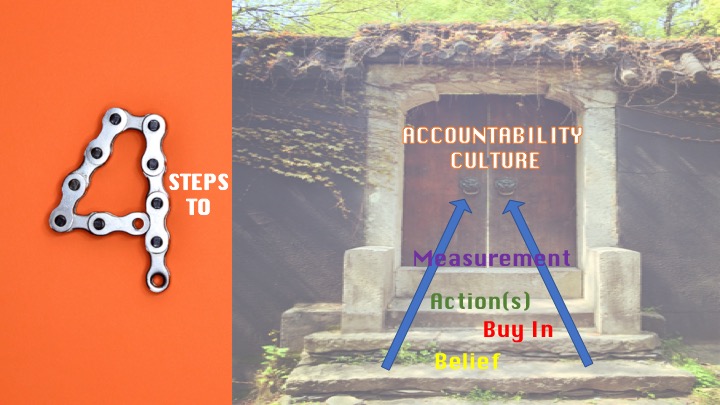Is 4-Step Accountability Right 4 You?

Let’s hold off figuring out how many steps and start with the primary question. Is creating an Accountability Culture a good move for your business…or your life for that matter? For a manager who wants to create better margins through efficiency we know that the results, that we can control, are either about people or processes. A business may have reams of processes and what would be a normal percentage of absolute optimum be? Accountability is a methodology as well as a culture that creates an environment where processes improve because there a connection between what needs to happen and the results.
So many of our business process failings are not because we may be missing the process, it may be incomplete or incompatible, need to be modernized or amended. A process is a fluid thing for sure but the biggest reason why processes fail is that people don’t follow them. And, by the way, a process that isn’t followed is sure to fail at worse, limp at best. So rather than address processes singularly with process improvement tactics what if you could make a more fundamental change in the people that could drive results in the processes?
MyEureka Solutions markets a 4-Step Accountability™ process to help businesses install a cultures that instills responsibility. For this we break “Accountability” into 4 steps:
Step 4 – Measurement
If we reverse engineer from accomplishment we’ll know we’ve arrived because we become comfortable measuring elements as well as outcomes, efforts as well as enterprise and we recirculate results into continuous improvement. Everyone is responsible for what they were supposed to do and a stronger force of team and or customer interest becomes the arbiter for conflict resolution or failing to meet expectations.
Step 3 – Actions/Belief
Nothing gets done, certainly nothing changes, without actions. It is, ultimately, what we do that creates our success. In opposition it is often what we don’t do that limits us although sometimes the opposites align. Not doing is the positive choice, doing the negative. Regardless they are all about action. When actions are structured into routines we call the behaviors. Managing the behaviors is critical to success and not just for one time but where it is self-managed and self-perpetuated.
Step 2 – Buy In
One step earlier we know that what we do has to do with what we have committed to. Whether that is procrastination or productivity our actions are grounded in our psychology that sparks them. There’s what we say we believe and then there’s how much we buy in. When you buy in fully there is a sincerity to your beliefs that will create consistency and longevity, a habit of productivity. You don’t debate yourself, you do. If you have a team beneath you it is their buy in that will determine whether the right actions get taken the right way, the right amount of time by the right people. If you are spreading culture you have to confirm your reports buy in. Likewise you have to hold them accountable to get their team to buy in. The more unified an organization “buys in” to a concept, accountability or otherwise, will be a predictor of improvement, or lack thereof.
Step 1 – Belief
So to start this train we realize that every dollar ever earned started as a concept in one’s mind. That concept became a belief. If this, then that. If a lot of this then a lot of that. If efficient this then even more of that. There is a difference between and idea and a belief. One is the qualifier and quantifier of the other. When our belief comes from a clear picture of an end result then we are ready to confirm our buy in, get going with actions aligned with goals, measure our improvements and take pride in responsibility. This base step shows us the promise of Accountability Culture.
Beware the Action Blockers (yours and others)
While all that action talk can have you lining up to walk the hot coals–and back! It’s an important element to understand that the sub-optimization of process, why it lacks or fails is often, as we said, because it was not followed. In other words a necessary action did not occur correctly, on time or at all. Why? We have to look for action blockers. When you know what you should do but you don’t do it. Are you avoiding something? Afraid of something, disinterested, making a point, assigning blame elsewhere…? The list can go on and on. What needs to be fixed isn’t always the process but what is keeping it’s cast of characters from the actions and behaviors necessary for success. Accountability Culture self perpetuates success and looks to continuously improve. Pretty good foundation for a business, no?
©2020 MyEureka Solutions LLC. For help with ACCOUNTABILITY CULTURE or BUSINESS THERAPY insights contact or follow @TomFoxTrainer, on LinkedIn or at www.myeurekasolutions.com/thoughts. His current book: Business Therapy: Ideas and Inspirations To Help Build Sales, Leadership, Management, and Personal Performance is available on Amazon.
